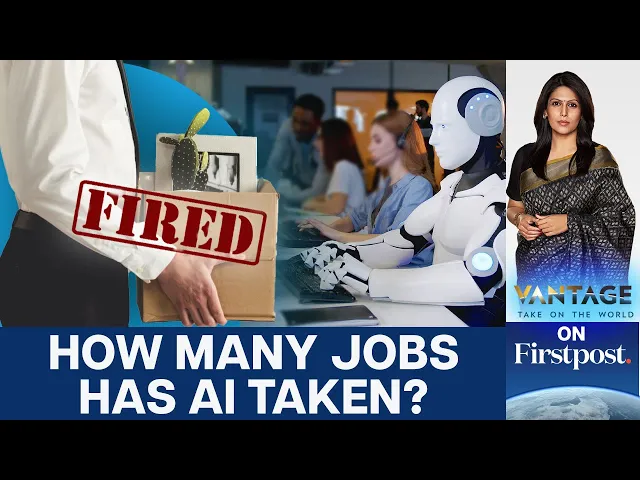AI Is Coming for Your Job Sooner Than You Think | Vantage with Palki Sharma

AI's acceleration towards the jobs apocalypse
The race between artificial intelligence and human workers has entered a decisive phase, with AI's pace of development outstripping even the most optimistic predictions from just a few years ago. The recent episode of "Vantage with Palki Sharma" on N18G places this technological revolution in stark relief, exploring how AI is rapidly transforming the employment landscape across industries and skill levels. What started as disruption to routine tasks has evolved into sophisticated systems challenging knowledge workers, creative professionals, and even executive functions.
Key insights from the discussion:
-
AI development is outpacing previous forecasts, with capabilities advancing exponentially rather than linearly, creating disruption across blue-collar, white-collar, and creative professions simultaneously.
-
The democratization of AI tools has lowered barriers to entry, allowing anyone with internet access to leverage capabilities that once required specialized technical teams, accelerating adoption and displacement.
-
Industries previously considered "AI-proof" – like creative fields, legal professions, and healthcare – are experiencing significant transformation as AI demonstrates unexpected competence in domains requiring judgment and nuance.
The inflection point we didn't see coming
The most compelling revelation from the discussion is that we've entered what experts call an "inflection point" in AI development – a moment when technological progress shifts from incremental to exponential. This is particularly evident in generative AI, which has moved from curiosity to competitive advantage in under two years.
This matters because our institutions, regulatory frameworks, and educational systems operate on much slower timescales than technological development. While previous technological revolutions unfolded over decades, giving societies time to adapt, the AI revolution is compressing this adaptation window dramatically. Companies that fail to integrate AI face competitive disadvantage, while workers without AI literacy risk obsolescence regardless of their experience or credentials.
What the discussion missed: The inequality dimension
While the video provides an excellent overview of AI's accelerating impact, it understates how unevenly these effects will be distributed. Early evidence suggests AI adoption widens existing socioeconomic divides rather than narrowing them. Companies with capital to invest in AI infrastructure gain advantages that smaller competitors cannot match, while knowledge workers with the skills to effectively prompt and direct AI tools create value that non-specialists cannot replicate.
This creates a "Matthew effect
Recent Videos
How To Earn MONEY With Images (No Bullsh*t)
Smart earnings from your image collection In today's digital economy, passive income streams have become increasingly accessible to creators with various skill sets. A recent YouTube video cuts through the hype to explore legitimate ways photographers, designers, and even casual smartphone users can monetize their image collections. The strategies outlined don't rely on unrealistic promises or complicated schemes—instead, they focus on established marketplaces with proven revenue potential for image creators. Key Points Stock photography platforms like Shutterstock, Adobe Stock, and Getty Images remain viable income sources when you understand their specific requirements and optimize your submissions accordingly. Specialized marketplaces focusing...
Oct 3, 2025New SHAPE SHIFTING AI Robot Is Freaking People Out
Liquid robots will change everything In the quiet labs of Carnegie Mellon University, scientists have created something that feels plucked from science fiction—a magnetic slime robot that can transform between liquid and solid states, slipping through tight spaces before reassembling on the other side. This technology, showcased in a recent YouTube video, represents a significant leap beyond traditional robotics into a realm where machines mimic not just animal movements, but their fundamental physical properties. While the internet might be buzzing with dystopian concerns about "shape-shifting terminators," the reality offers far more promising applications that could revolutionize medicine, rescue operations, and...
Oct 3, 2025How To Do Homeless AI Tiktok Trend (Tiktok Homeless AI Tutorial)
AI homeless trend raises ethical concerns In an era where social media trends evolve faster than we can comprehend them, TikTok's "homeless AI" trend has sparked both creative engagement and serious ethical questions. The trend, which involves using AI to transform ordinary photos into images depicting homelessness, has rapidly gained traction across the platform, with creators eagerly jumping on board to showcase their digital transformations. While the technical process is relatively straightforward, the implications of digitally "becoming homeless" for entertainment deserve careful consideration. The video tutorial provides a step-by-step guide on creating these AI-generated images, explaining how users can transform...
